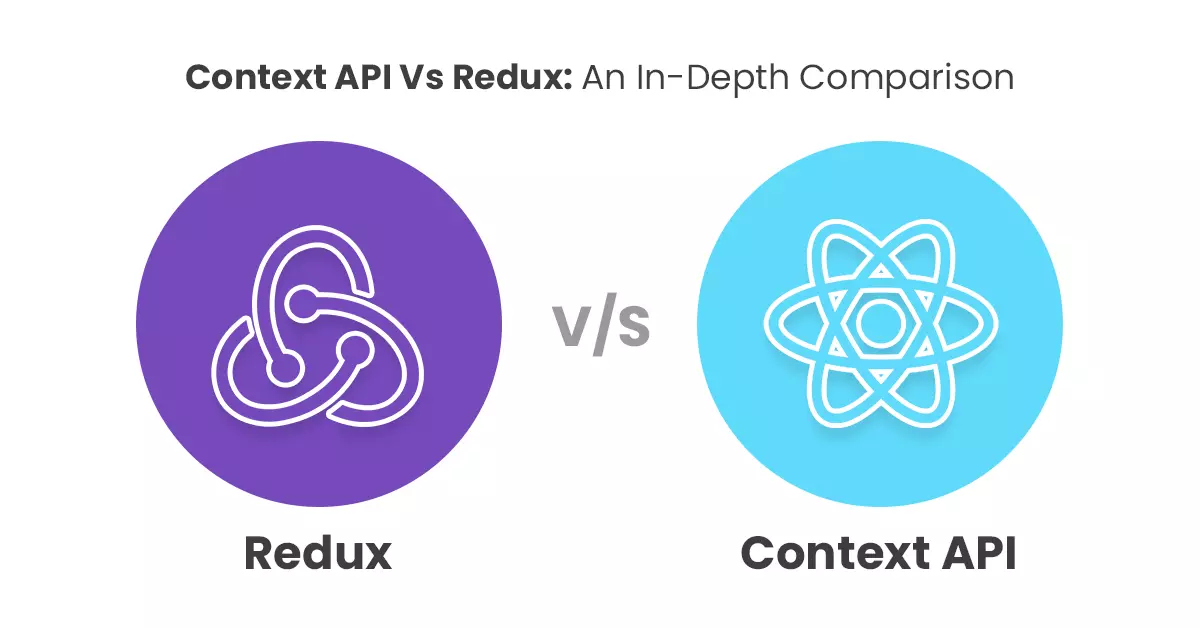Context API Vs Redux: An In-Depth Comparison

State management is an essential component of every program in the modern world of web development. There are many ways to handle state management, but the two most popular ones are Redux vs Context API. Context API and Redux both have advantages and disadvantages and can be used for various things. In this blog, we’ll compare React Context vs Redux, analyzing their performance, features, and when to use each. Let’s dive in!
What is Redux?
Redux is a predictable state container for JavaScript applications. Introduced in 2015 by Dan Abramov and Andrew Clark, Redux has become one of the most widely used React context API state management solutions. It centralizes application state in a single store and ensures state updates in a predictable manner.

What is Context API?
React added the Context API feature in version 16.3. It allows components to communicate without passing data through props. Context API provides a way to share data that is global to your application, such as the theme of your application or the authenticated user.
Pros of Redux
Predictable State Management
One of the biggest benefits of using Redux is that it provides a predictable way to manage state. With Redux, you can easily see what has changed in the state of your application and what has caused the change. This makes it easier to debug your application and ensures that your state is always in a known state.
Easy to Test
Utilizing Redux also makes it simpler to test your application, which is a bonus. Since the state of your application is stored in a single place, it is easier to test how your application behaves when the state changes.
Strong Community Support
Redux has a large community of developers who use it and contribute to it. This indicates that there are numerous learning resources available to you and that numerous tools have been developed to make it easier for you to use them.
Cons of Redux
Complexity
One of the biggest disadvantages of Redux is that it can be quite complex to set up and use. You need to write a lot of code to get started with Redux and it can be difficult to understand how everything fits together.
Boilerplate Code
Redux also has the disadvantage of requiring a lot of boilerplate code. You need to write code to create actions, reducers, and store. This can be time-consuming and make it difficult to understand what is going on in your application.
What is Context API?
React introduced the Context API in version 16.3 as a built-in way to manage global state. Unlike Redux, which requires external libraries, the React Context API state management system allows components to communicate without prop drilling.
Pros of Context API
Simplicity
One of the biggest benefits of using Context API is that it is simple to use. You don’t need to write a lot of code to get started and it is easy to understand how everything works. Context API vs Redux performance shows that Context API is easier to implement, requiring less boilerplate code.
Reduced Boilerplate Code
Another benefit of using Context API is that it reduces the amount of boilerplate code you need to write. You don’t need to write actions, reducers, and store, which makes it easier to get started. With React Context API, you don’t need to write separate actions and reducers, making development faster.
Better Performance
Context API is faster than Redux because it doesn’t require you to create a new state every time the state changes.
Disadvantages of Context API
Limited Functionality
One of the biggest drawbacks of using Context API is that it has limited functionality. You can’t use it to manage the state of your application in a single store and it is not as flexible as Redux.
Lack of Community Support
Another drawback of using Context API is that it doesn’t have the same level of community support as Redux. This means that there are fewer resources available for

Redux Vs Context API: Which to Use?
Whether to use Redux vs Context API is based on the size of your application.
- Use Context API for small and medium applications with little global state management needed.
- Use Redux for large applications with structured state management, scalability, and debugging support.
Conclusion
If you’re developing a simple app or need lightweight state management, React Context API is a great choice. It reduces boilerplate code and improves performance for smaller applications.
However, Redux remains the go-to solution for large-scale applications that demand robust state management and predictable data flow. It offers extensive community support, better debugging capabilities, and scalability, making it ideal for complex applications.
Now that you know the pros and cons of Redux vs Context API, which one will you choose for your next project?





